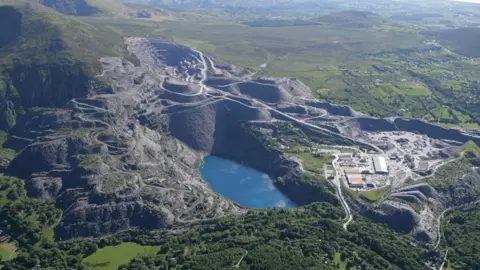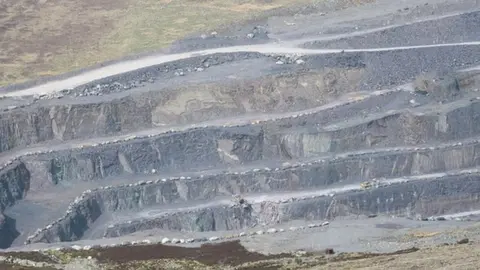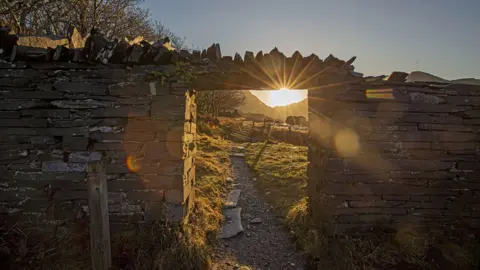Gwynedd: Historic 13C slate quarry allowed to expand
 RCAHMW
RCAHMWOne of the world's oldest slate quarries is set to continue until 2035 after council planners approved its expansion.
The quarry at Penrhyn in Bethesda has been producing roofing slate since the 13th Century.
Welsh Slate told Gwynedd council a six-acre (2.3 hectares) "lateral extension" of the quarry would secure 115 jobs.
A planning report found the expansion would mean demolishing a medieval multicellular sheep fold.
Planners said the removal of this structure would result in "a small indirect impact on the historic landscape" and its existence would be recorded by archaeologists. It was also deemed to have no impact on the area's bid to become a UNESCO for World Heritage site.
Welsh Slate said the demolition would allow the quarry to go around a "geological anomaly" that was hampering production, the Local Democracy Reporting Service said.
"These plans mean we will be able to extract Welsh slate, premium, Penrhyn purple roofing slate, up to 250,000 tonnes," said Shaun Denny of Breedon Trading Ltd, trading as Welsh Slate, "for which there is a world-wide waiting list".
Welsh Slate said it would be able to produce two million tonnes of decorative red and blue slate helping it to secure capital, jobs and expand its product range.
"It also means 115 skilled jobs," Mr Denny added. "With the quarry's history and recognised place in the community, our hopes are to secure a bright future for the area and site."
 Eric Jones
Eric JonesIn 2012 Gwynedd council allowed the quarry to expand by a 20-acres (eight hectares), extending its operating life by up to 15 years.
The new application said work in the new extraction area would be done "in the same manner" as the current working agreements.
Dust and complaints, working hours, restriction on noise, and mitigation of the impact of blasting methods would continue to be monitored, it said.
HGV movements will not change either, the application said.
 Peter Byrne/PA Wire
Peter Byrne/PA WireA separate planning application Welsh Slate to extend the time frame for operations to extract stone until 2035 and up to 2037 for site restoration was also submitted.
Gwynedd council unanimously approved both applications.
